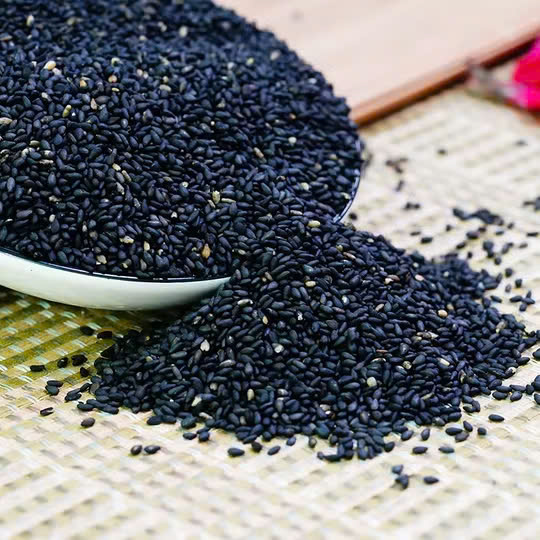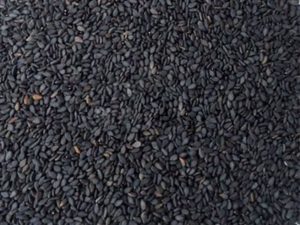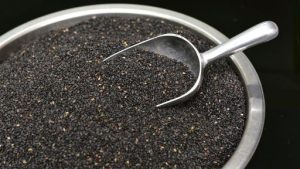
Black sesame seeds, with their tiny, jet-black kernels, are not only a familiar ingredient in cuisine but also a high-potential agricultural export commodity for Vietnam. Thanks to their high nutritional content, distinctive flavor, and diverse applications, Vietnamese black sesame is gradually asserting its position in the international market, bringing significant economic value to farmers and businesses.
1. Origin and Growing Regions of Black Sesame in Vietnam:
Black sesame (Sesamum indicum) originated in Africa and India and was subsequently introduced and widely cultivated in many countries worldwide, including Vietnam. In Vietnam, black sesame plants thrive in hot, humid climates and dry land. The main growing regions for black sesame are concentrated in the South-Central coastal provinces (such as Binh Thuan, Ninh Thuan), the Central Highlands (Dak Lak, Lam Dong), and some northern mountainous provinces. Each growing region can yield black sesame with different flavor profiles and qualities due to variations in soil and climate conditions.
2. Outstanding Nutritional Value of Black Sesame:
Black sesame is a rich source of nutrients, offering numerous health benefits. In 100g of black sesame seeds, you can find:
- Fat: Approximately 50g, mainly monounsaturated and polyunsaturated fatty acids (omega-6, omega-9), which are good for heart health.
- Protein: Approximately 18g, an important source of plant-based protein.
- Fiber: Approximately 12g, supporting digestion and blood sugar control.
- Vitamins: Rich in vitamin E (a powerful antioxidant), vitamin B1, B3, and B6.
- Minerals: Contains significant amounts of calcium (very good for bones), iron (prevents anemia), magnesium, phosphorus, potassium, zinc, copper, manganese, and selenium.
- Plant compounds: Lignans (sesamin, sesamolin), phytosterols, and flavonoids, which have antioxidant, anti-inflammatory, and heart health-promoting properties.
Thanks to this impressive nutritional content, black sesame is considered a beneficial food for overall health.

3. Large Global Market Demand:
Black sesame is widely used in various industries worldwide, including:
- Food: It is a crucial ingredient in the production of confectionery (sesame cakes, sesame candy), sauces (tahini), cooking oil (sesame oil), vegetarian dishes (sesame milk, sesame porridge), and nutritional products (energy bars, granola). The increasing demand for healthy and natural-origin products creates favorable conditions for black sesame.
- Pharmaceuticals and Functional Foods: Black sesame contains valuable nutrients such as vitamin E, calcium, iron, magnesium, fiber, and antioxidants. Therefore, it is used in the production of functional foods (sesame oil capsules, black sesame powder) and health care products.
- Cosmetics: Black sesame oil is known for its moisturizing, skin and hair softening, and anti-aging properties. It is an ingredient in many natural skin and hair care products.

4. Potential Export Markets for Vietnamese Black Sesame:
Vietnam is currently exporting black sesame to many markets around the world, with the main markets including:
- Asia: Japan, South Korea, China, India, and Southeast Asian countries. These are markets with high consumption demand for black sesame for both food and industrial purposes.
- Europe: EU countries (Germany, France, Netherlands, UK…), and Russia. The demand for organic and high-quality black sesame is increasing in this region.
- North America: The United States and Canada. This market has significant potential for processed black sesame products and healthy products.
- Middle East: Some countries have a tradition of using black sesame in their cuisine.
Diversifying export markets will help minimize risks and enhance the stability of Vietnam’s black sesame industry.
5. Typical Dishes and Products Made from Black Sesame:
Black sesame is a versatile ingredient used in many different dishes and products, both traditional and modern:
- Traditional Dishes:
- Bánh mè (Sesame crackers/biscuits): Crispy and fragrant sesame cakes.
- Kẹo mè xửng (Sesame brittle): A famous specialty from Central Vietnam.
- Muối mè (Sesame salt): A familiar condiment in daily meals.
- Chè mè đen (Black sesame sweet soup): A nutritious and delicious dessert.
- Xôi mè đen (Black sesame sticky rice): Sticky rice with an appealing color and distinctive flavor.
- Gỏi cuốn chấm tương mè (Spring rolls with sesame dipping sauce): An interesting twist on spring rolls.
- Processed Products:
- Dầu mè (Sesame oil): Used for stir-frying, salads, or as a seasoning.
- Sữa mè đen (Black sesame milk): A nutritious and tasty beverage.
- Bột mè đen (Black sesame powder): Used to make drinks, bake, or add to other dishes.
- Tahini: Black sesame butter, a key ingredient in hummus and many Middle Eastern dishes.
- Energy bars and granola: Black sesame is a nutritious component in these products.
- Cosmetic products: Black sesame oil in skin creams, hair oils, and soaps.
- Functional foods: Black sesame oil capsules, black sesame powder for nutritional supplements.
6. Conclusion:
Black sesame export is not only an economic opportunity but also a way to promote Vietnamese agricultural products to the world. With its clear origin, diverse growing regions, outstanding nutritional value, large market demand, and numerous applications, Vietnamese black sesame has the full potential to become a key export commodity, bringing sustainable benefits to both farmers and the country’s economy. Continuing to improve quality, build brands, and diversify products will be the key to maximizing the potential of this “black gem” in the international market.
Other articles:
Other agricultural products:


